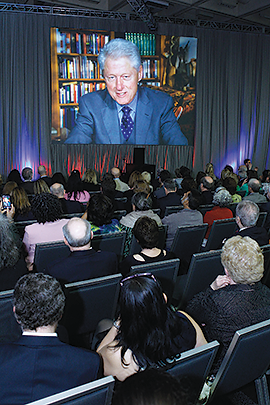Clinton Calls for Creative Problem Solving
Abstract
The 42nd U.S. president said the downsides of global interdependence are an excess of inequality and instability.
Global interdependence requires a new kind of problem solving that doesn’t require killing off one side, but allows all parties to win.
That’s what Bill Clinton, 42nd president of the United States, told APA members in a keynote address at APA’s 2013 annual meeting last month in San Francisco.
Clinton’s comments were part of a remarkable address in which he talked to a packed hall of meeting attendees by satellite about a range of public-policy issues—foreign and domestic—which, because of global interdependence, now require new ways of problem solving.

Former U.S. President Bill Clinton delivers a keynote speech via satellite to attendees at APA’s 2013 annual meeting last month in San Francisco. He said that mental health care issues are ones on which he would expect there to be bipartisan cooperation, adding that the United States needs to join all other advanced societies in ensuring that there is affordable mental health care.
“We are interdependent in so many ways,” Clinton said. “America has grown ever more diverse, and you are meeting in one of our most diverse cities. . . . But there are several profound downsides. The first is that there is too much inequality. We are all willing to tolerate in a market system that rewards hard work and years of preparation a certain amount of income inequality. But too much is devastating, because you can’t expand the circle of consumers, and it is bound to translate into inequalities in health. There’s way too much inequality in the world today.
“The second problem is that there is too much instability in the world,” he said. “A little instability is part of a creative process. But with too much instability, it’s just as if the world is totally static because people are afraid to make any move. That’s what happened because of the global financial crisis, which spread across the world very rapidly and made everyone scared to death.”
He said problem solving today in advanced countries requires systems to change in ways that may be painful. “At some point, all systems become more interested in preserving their present distribution of influence and control than advancing the purpose for which they were established if it requires some painful change. They become more interested in preserving the present than creating the future. That’s why what we have to do in America is be willing to change these systems to create a wider circle of shared citizenship and genuine community.”
He cited as an example the work of his foundation—the William J. Clinton Foundation—in negotiating with the soft-drink industry to decrease sugar in drinks consumed by school children. “In America, our number-one public-health problem is childhood obesity,” he said. “When I started, I realized this was a direct function of our ability to produce enormous amounts of food, even though there is still a large number of Americans who are food insecure because we have too much inequality. And I learned that for any number of reasons we have people who are just on the other side of poverty consuming too many calories from unhealthy carbohydrates and sugar, including young school children who were getting as much as 50 percent of their daily calories just from the drinks they consumed in schools.
“I decided it was inherently unreasonable to believe the soft-drink and juice companies wanted all school kids in America to become seriously diabetic in their 20s and have amputations in their 30s and not be able to afford soft drinks. I didn’t believe they were that evil or shortsighted. So I met with them, and I asked them to figure out a way to make money with a radically different business plan. They came up with a plan to get rid of all full-sugar drinks and full-sized juices and replace them with flavored waters. The result was a reduction in calories being consumed in drinks by our children in school.”
He cited a similar approach to making generic AIDS drugs more affordable in third-world countries. He said he believed the achievement of universal access to health care, including mental health care, should be looked at the same way.
“On balance I think you should be hopeful,” Clinton said. “We have come a long way on the issue of mental health coverage since my grandmother was hospitalized briefly in a state hospital in the 1950s. I have seen the dark side of this, and I have seen the bright, wonderful work that you do.
“As you look into the future and think about the main mental health and substance abuse issues and how we are going to implement the Affordable Care Act and whether mental health will be shortchanged—I ask you to think about all these things. We need to try to find solutions where we don’t have to kill off one of the players in order to do a good thing, and where people agree to do things in a different way so we can advance the quality of health care and the decency of social justice in America.
“It is hard for me to believe that [mental health] is not one issue where there ought to be the possibility of bipartisan cooperation,” he said. “This issue still needs to be destigmatized among some. But it is now largely a question of problem-solving. . . . There has got to be a way out of this [political gridlock] so that we join every other wealthy, decent society on earth and provide universal, affordable health care to all that doesn’t exclude mental health care.” ■



